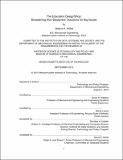The Education DesignShop : broadening non-designers' solutions for big issues
Author(s)
Artiles, Jessica A
DownloadFull printable version (35.11Mb)
Alternative title
Education Design Shop : broadening non-designers' solutions for big issues
Other Contributors
Massachusetts Institute of Technology. Department of Mechanical Engineering.
Advisor
David R. Wallace and Micah Lande.
Terms of use
Metadata
Show full item recordAbstract
Education in America can benefit from innovation. Creating problem-solving and inventive, innovative thinking from a diverse array of people and experiences can help redefine and reinvent this important public mission. Hackathons are collaborative, short sprints that offer such collaboration opportunities. While usually coding marathons, hackathon-type events like an Education Designathon and Education DesignShop have been developed by the researcher to tackle broad, systemic issues, here within the context of education, with tools and processes from design thinking. Two research questions are explored, with novel metrics and methods developed for each: 1) How do non-designers transform into design thinkers from the Education DesignShop? and 2) How do educational projects from the Education DesignShop workshop model address systemic changes? In the first pilot study of this thesis, an Education Designathon event emphasizes on this designerly mindset and the projects. Fourteen ingredients critical to the successful recipe of a hackathon, or Designathon-type event were identified. A further iteration, the Education DesignShop, was implemented with design thinking as a problem-solving approach to help in solving broad, systemic issues while also teaching people new ways to collaborate and form sustainable solutions. Eight key components are identified with a structure established around just-in-time modules that teaching design thinking and challenge participants to apply these methods towards their re-designs of the education system. Projects in the Education DesignShop show a larger number of designerly attributes and are farther along Anderson's Continuum of Systemic Change. Policy implications suggest ways to support further propagation of design thinking to address problems around education.
Description
Thesis: S.M. in Technology and Policy, Massachusetts Institute of Technology, Institute for Data, Systems, and Society, Technology and Policy Program, 2015. Thesis: S.M., Massachusetts Institute of Technology, Department of Mechanical Engineering, 2015. Cataloged from PDF version of thesis. Includes bibliographical references (pages 155-161).
Date issued
2015Department
Massachusetts Institute of Technology. Department of Mechanical Engineering; Massachusetts Institute of Technology. Engineering Systems Division; Massachusetts Institute of Technology. Institute for Data, Systems, and Society; Technology and Policy ProgramPublisher
Massachusetts Institute of Technology
Keywords
Institute for Data, Systems, and Society., Engineering Systems Division., Technology and Policy Program., Mechanical Engineering.